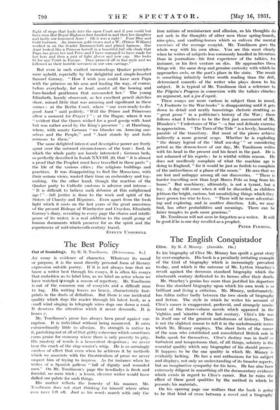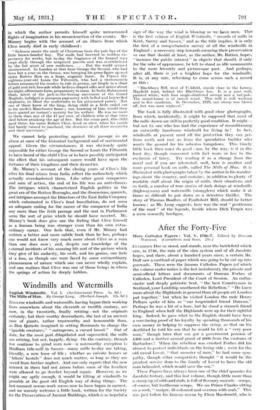The English Conquistador
Clive. By R. J. Ninny. (Jarrolds. 16s.) IN his biography of Clive Mr. Minney has spoilt a great story by over-emphasis. His book is a peculiarly irritating example of the kind of biography which is increasingly prevalent to-day, and which is the outcome of Mr. Lytton Strachey's revolt against the decorous standard biography which the nineteenth century dedicated to its heroes after their death.
Mr. Strachey's genius has more than justified his departure from the standard biography upon which his own work is so brilliant and living a criticism. Mr. Minney, unfortunately, has fallen rather badly between the two stools of biography and fiction. The style in which he writes his account of Clive's career is exaggerated, perfervid, and strangely remin- iscent of the three-volume novels which .appeared in the 'eighties and 'nineties of the last century. ClOe's life was in itself One of the greatest melodramas of history. There is not the slightest reason to tell it in the melodramatic terms which Mr. Minney employs. The sheer facts of the career of the man who established and consolidated British rule in India speak for themselves. Clive's destiny was in itself so turbulent and tempestuous that, of all things, sobriety is the essential quality which any biographer of his should possess. It happens to be the one quality in which Mr. Minney is evidently lacking. He has a real enthusiasm for his subject and displays, not only an understanding of its broader aspects, but an imaginative sympathy for his hero. He has also been extremely diligent in unearthing all the documentary evidence which exists in regard to Clive's career. But he ruins the effect of these good qualities by the method in which he presents his materials.
On his opening page one realizes that the book is, going to be that kind of cross between a novel and a biography
in which the author permits himself quite unwarranted flights of imagination in his reconstruction of the events. Mr. Minney begins with the account of an illness from which
Clive nearly died in early childhood : " Sickness smote the smile of Christmas from the pale lips of the little brown-headed' boy. The smile had hovered in: restless ex- pectancy. for weeks, but to-day the fragrance of the heaped toys crept shyly, through the unopened parcels and was overwhelmed by the hot see/it of new medicines. . . . But the world seemed unconcerned. In London at that hour George the Second, who had been but a year on the throne, was bumping his gross figure up and down Rotten Row on a large, ungainly horse. In France the eighteen-yearold Letitia the Fifteenth, who had a twelvemonth before announced his resolve to rule in person, sat limply in a chair of gold and rich brocade while lackeys.draped silks and satins about his slight, effeminate form, preparatory to mass. In India Muhammad Shah, latest of the jack-in-the-boxing successors of the Grand Moghuls, indulged in pompous pageantry with belled and bejewelled elephants, to blind the multitudes to his attenuated power. • Not one of these knew of the limp, dying child in a little railed cot in his uncle's Manchester home ; nor, knowing of him, would they have spared an instant's anxiety for his welfare. He was no more to them than any of the 47 per cent. of children who at that time died before attaining the age of five. But the crisis past, this child aged three, his name Robert Clive, lived to alter, when his youth had barely turned to manhood, the destinies of all three monarchs and their successore."
We cannot help protesting against this passage as an abuse at once of the historical background and of sentimental appeal. Given the circumstances, it was obviously quite impossible_ for either George the Second or Louis the Fifteenth to have heard of the child Clive or to have possibly anticipated the effect that his subsequent career would have upon the fortunes of their kingdoms and their dynasties.
Mr. Minney's account of the closing years of Clive's life after his final return from India reflect the melancholy which actually overshadowed them. Like other great conquerors and men of action, the end of his life was an anti-climax. The intrigues which characterized English politics in the great era of the Rotten Boroughs, and the dissensions, quarrels, and intrigues amongst the Directors of the East India Company which culminated in Clive's final humiliation, do not seem an adequate ending for the career of the conqueror of India any more than the Irish peerage and the seat in Parliament seem the sort of prize which he should have coveted. Mr. Minney's book does give one the feeling that Clive himself as a human being was stranger even than his own extra- ordinary career. One feels that, even if Mr. Minney had written a better and more subtle book than he has, perhaps one would not know very much more about Clive as a man than one does now ; and, despite our knowledge of the external incidents of his amazing life and of the picture which they give of his audacity, his craft, and his genius, one feels at a loss, as though one were faced by some extraordinary phenomenon of nature which one can never wholly explain, and one realizes that Clive was one of those beings in whom the springs of action lie deeply hidden.



















































 Previous page
Previous page